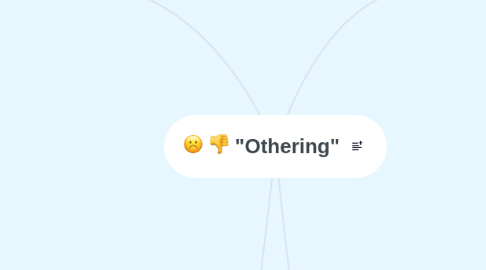
1. "Othering" in Palestine
1.1. British/Zionist give Israel/Palestine to Jewish settlers, claiming that it is unoccupied land when in fact Palestinian Arabs live there.
1.1.1. Israeli Jews run the Palestinians out of their homes and lands; demolish their homes.
1.2. Palestinian Arab's are run out of their homes, subjected to refugee camps living in squalor and harsh conditions.
1.2.1. The refugee camps are filthy, muddy, the homes are small, destroyed from the storms, family members are packed into small living quarters.
1.3. Israeli's control the agricultural sector.
1.3.1. Israeli's cut down Arabs olive trees which they use for food and for selling for profit.
1.3.2. Israeli's are charge less for exporting agricultural foods to Europe.
1.3.3. Israeli's produce is shipped out ahead of Palestinians produce so that the Palestinians produce spoils before getting to the destination.
1.4. Israeli's control the labor force.
1.4.1. They only allow a certain amount of work permits for Palestinians to work in Israel.
1.4.2. They don't allow Palestinians to conduct any work that'll threaten the Israeli counterpart.
1.5. Israeli police use brutal force and are unregulated.
1.5.1. They get away with killing, beating, imprisoning, humiliating, etc. Palestinians.
1.5.2. They take aggression out on random Palestinians if any of their own is hurt.
1.5.3. Racial profiling.
1.6. The Jewish Settlers are viewed as superior and go unpunished.
1.6.1. Jewish settlers raid Palestinian villages and homes, stoning and shooting Arabs.
1.6.2. Settlers claim that they are the one's being attacked when they are the instigators.
1.6.3. After an attack, the Palestinian Arabs must report it to the law enforcement which is located at the Jewish Settlement.
1.6.3.1. These cases/reports are never followed up, Settlers get away with it or turn the blame on the Palestinians.
1.7. Othering is perpetuated to live on through the children.
1.7.1. The violent Jewish settlers bring their children to the attacks on the Palestinians in chapter 3.
1.7.2. Even the Palestinian's perpetuate the racism, Arab children throw stones at Sacco in the second chapter thinking he is a Jew.
1.7.3. Palestinian children are forced to think about the infada, the youth clubs are kept closed, no chance to be a kid.
1.7.4. Some kids are described to join the resistance and are injured. At first they feel like heroes, but living with the injury soon kicks in when they don't feel the support of others.
1.8. Israeli's control water.
1.8.1. A notion that is accepted today is that water is a basic human right and that water cannot be owned, everyone has a right to it.
1.8.2. In the refugee camp described in chapter 6, Israeli's leave the Palestinians with 17% of water, although the refugee camps are densely populated.
2. What is "othering"?
2.1. The perception of an entity as distinct in relation to other entities; (in later use) spec. the perception or representation of a person or group of people as fundamentally alien from another, frequently more powerful, group. Cf. other pron. and n. 9.
2.1.1. "othering, n." OED Online, Oxford University Press, June 2019, www.oed.com/view/Entry/263203. Accessed 18 July 2019.
2.2. My definition: marginalizing a person or group based on racism, sexism, xenophobia,
3. Toni Morrison Quotes on "othering
3.1. “This is a work about the creation of aliens and the erection of fences”
3.2. “The psychological work of Othering - of convincing oneself that there is some sort of natural and divine delineation between the enslaver and the enslaved.”
3.3. “The necessity of rendering the slave foreign species appears to be a desperate attempt to confirm one’s own self as normal”
3.4. “But for humans as an advanced species, our tendency to separate and judge those not in our clan as the enemy, as the vulnerable and the deficient needing control, has a long history not limited to the animal world or prehistoric man. Race has been a constant arbiter of difference, as have wealth, class, and gender - each of which is about power and the necessity of control”
3.5. "One purpose of scientific racism is to identify an outsider in order to define one’s self. Another possibility is to maintain (even enjoy) one’s own difference without contempt for the categorized difference of the Othered”
3.6. “[O]ne learns Othering not by lecture or instruction but by example”
3.7. How does one become a racist, a sexist? Since no one is born a racist and there is no fetal predisposition to sexism, one learns Othering not by lecture or instruction but by example.’
4. "Othering" in Maus I
4.1. Jews are mice Poles are Pigs Germans are Cats
4.2. Some evidence of "othering" before the war within the Jewish community.
4.2.1. Evident by the separation of Vladek & Anja & Lucia. Anja's family was very wealthy and appeared closed off from the world. That is until the war, then their money and status meant nothing.
4.2.2. The Jewish Police also "othered" the rest of the Jewish population. I assume this is a survival tactic to treat the "othered" poorly in order to get the light off themselves and to blend in.
4.3. Jews & Poles first lived and worked together, then when the war started, the Poles "othered" the Jews.
4.3.1. The Poles separated themselves from the Jews. Richie's governess turned against them in their time of need.
4.3.2. Most of the Poles would out any Jews they'd see.
4.4. The Germans/Nazi's "othered" the Jews.
4.4.1. They exerted their power over them by deporting, punishing, beating, and killing anyone they pleased regardless if the Jews had proper paperwork or not.
4.4.2. They also exerted their dominance over the Jews by establishing a curfew, requiring coupons to purchase anything, controlling their jobs and what and how much they are allowed to eat.
4.4.3. Deported thousands of Jews sending them to their deaths.
4.4.4. Determined the value of peoples lives and whether they deserved to live or deserved to die.
